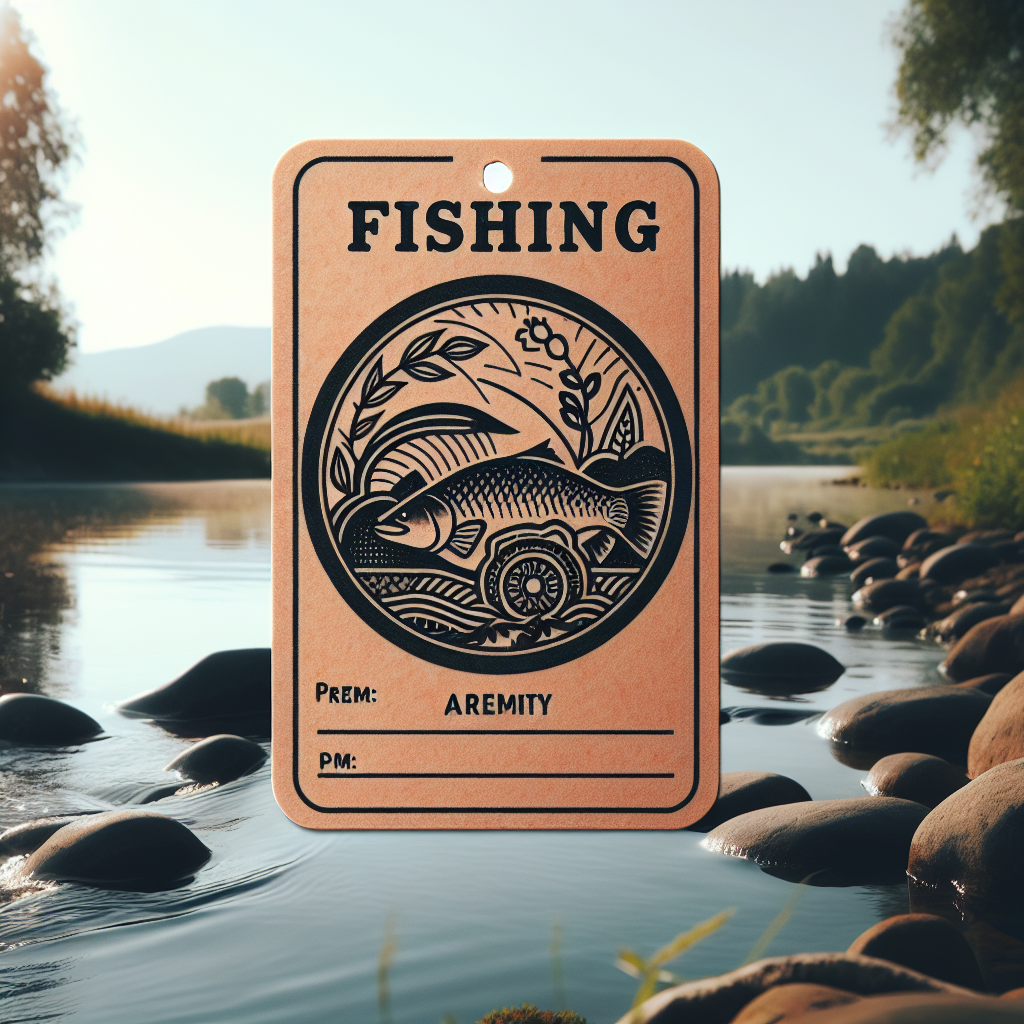The Importance of Obtaining a Fishing Permit: Why It’s Necessary for Responsible Fishing Practices
Fishing has been a popular activity for centuries, providing a source of food and recreation for many people around the world. However, with the increasing demand for fish and the advancements in fishing technology, the sustainability of our oceans and marine life has become a major concern. In order to regulate and monitor fishing activities, many countries have implemented the requirement of obtaining a fishing permit. In this article, we will discuss the importance of obtaining a fishing permit and why it is necessary for responsible fishing practices.
First and foremost, a fishing permit is a legal document that allows an individual or a group to engage in fishing activities in a specific area. It is issued by the government or a designated authority and is subject to certain rules and regulations. The main purpose of a fishing permit is to ensure that fishing is done in a sustainable and responsible manner, without causing harm to the marine ecosystem.
One of the key reasons why obtaining a fishing permit is necessary for responsible fishing practices is that it helps in the conservation of fish populations. With the increasing demand for fish, overfishing has become a major threat to the sustainability of our oceans. By requiring individuals to obtain a fishing permit, authorities can monitor the number and types of fish being caught, and set limits to prevent overfishing. This not only helps in preserving fish populations but also maintains the balance of the marine ecosystem.
Moreover, a fishing permit also helps in promoting responsible fishing practices. In order to obtain a fishing permit, individuals are required to undergo training and education on sustainable fishing methods. This includes learning about the types of fish that can be caught, the size and number limits, and the use of proper fishing gear. By educating individuals on responsible fishing practices, it not only ensures the sustainability of fish populations but also reduces the impact on other marine life such as dolphins, turtles, and seabirds.
In addition to conservation and responsible fishing practices, obtaining a fishing permit also helps in the management of fishing activities. With a fishing permit, authorities can keep track of the number of individuals engaging in fishing, the areas being fished, and the types of fish being caught. This information is crucial in managing fishing activities and making informed decisions on the allocation of fishing quotas. It also helps in identifying any illegal fishing activities and taking necessary actions to prevent them.
Furthermore, a fishing permit also plays a role in promoting safety and security in the fishing industry. By requiring individuals to obtain a fishing permit, authorities can ensure that only qualified and trained individuals are engaging in fishing activities. This reduces the risk of accidents and promotes a safe working environment for fishermen. It also helps in preventing illegal and unregulated fishing, which can lead to conflicts between fishermen and authorities.
Lastly, obtaining a fishing permit also has economic benefits. By regulating fishing activities, authorities can ensure that the fishing industry remains sustainable and profitable. This not only benefits the fishermen but also the local economy. In addition, the revenue generated from fishing permits can be used for conservation and management efforts, further promoting responsible fishing practices.
In conclusion, obtaining a fishing permit is not only necessary for responsible fishing practices but also plays a crucial role in the conservation, management, and sustainability of our oceans. It promotes responsible fishing methods, ensures the safety and security of fishermen, and has economic benefits. As responsible citizens, it is our duty to obtain a fishing permit and contribute to the preservation of our marine ecosystem for future generations.
Navigating the Process of Applying for a Fishing Permit: Tips and Tricks for a Smooth Experience

Navigating the process of applying for a fishing permit can be a daunting task for many individuals. The paperwork, fees, and regulations can seem overwhelming, but with the right knowledge and preparation, the process can be smooth and hassle-free. In this article, we will discuss the steps involved in obtaining a fishing permit and provide some tips and tricks to make the experience as seamless as possible.
The first step in obtaining a fishing permit is to determine which type of permit you need. There are various types of fishing permits, including recreational, commercial, and tribal permits. Each type has its own set of requirements and regulations, so it is essential to research and understand which permit is appropriate for your needs.
Once you have determined the type of permit you need, the next step is to gather all the necessary documents. This may include identification, proof of residency, and any other relevant documents required by your state or country. It is crucial to have all the required documents in order to avoid delays in the application process.
After gathering the necessary documents, the next step is to fill out the application form. This form can usually be found online or at the local fish and wildlife office. It is essential to fill out the form accurately and completely to avoid any delays or rejections. Some tips for filling out the form include double-checking all information, using legible handwriting, and providing all required information.
One crucial aspect of the application process is paying the required fees. The fees for fishing permits can vary depending on the type of permit and the state or country in which you are applying. It is essential to research the fees beforehand and have the necessary funds available to avoid any delays in the application process.
Once the application form and fees have been submitted, the next step is to wait for approval. The waiting period can vary depending on the type of permit and the volume of applications being processed. It is essential to be patient during this time and avoid contacting the issuing agency unless necessary. In some cases, you may be required to attend an interview or provide additional information before your permit is approved.
If your permit is approved, congratulations! You are now ready to go fishing. However, it is crucial to understand that obtaining a fishing permit does not give you free rein to fish wherever and whenever you want. There are still regulations and restrictions that must be followed to ensure the sustainability of fish populations and the safety of other individuals.
One of the most important regulations to follow is knowing the fishing seasons and limits for the species you are targeting. These regulations can vary depending on the location and time of year, so it is essential to research and understand them before heading out to fish. Additionally, it is crucial to follow all size and catch limits to avoid fines or penalties.
Another important aspect to consider is the type of gear and equipment you are using. Some areas may have restrictions on the type of gear allowed, such as the use of barbed hooks or certain types of bait. It is essential to research and understand these regulations to avoid any violations.
In conclusion, navigating the process of applying for a fishing permit may seem overwhelming, but with the right knowledge and preparation, it can be a smooth and hassle-free experience. By understanding the type of permit you need, gathering all necessary documents, filling out the application accurately, paying the required fees, and following all regulations, you can obtain a fishing permit and enjoy a day out on the water. Remember to always follow the rules and regulations to ensure the sustainability of fish populations and the safety of yourself and others. Happy fishing!
Understanding the Different Types of Fishing Permits: Which One is Right for You?
Fishing is a popular recreational activity enjoyed by millions of people around the world. However, in order to engage in this activity, one must obtain a fishing permit. A fishing permit is a legal document that allows an individual to fish in a specific area for a designated period of time. There are various types of fishing permits available, each with its own set of rules and regulations. In this article, we will discuss the different types of fishing permits and help you determine which one is right for you.
The first type of fishing permit is the recreational fishing permit. This permit is typically required for individuals who engage in fishing as a hobby or for leisure purposes. It allows the holder to fish in designated areas for a specific period of time, usually a day, week, or year. Recreational fishing permits are often issued by state or local governments and can be obtained online or at designated locations.
Another type of fishing permit is the commercial fishing permit. This permit is required for individuals or businesses that engage in fishing for profit. Commercial fishing permits are more complex and require a thorough application process. They also come with stricter regulations and may have limitations on the type and amount of fish that can be caught. These permits are typically issued by government agencies and may require additional fees and documentation.
In addition to recreational and commercial fishing permits, there are also special permits for specific types of fishing. For example, a fly fishing permit is required for individuals who engage in fly fishing, which involves using a lightweight lure to catch fish. This type of permit may have its own set of regulations and restrictions, such as the type of fly used or the size of the fish that can be caught.
Another special permit is the saltwater fishing permit. As the name suggests, this permit is required for individuals who wish to fish in saltwater bodies such as oceans, bays, and estuaries. Saltwater fishing permits may have different regulations and fees compared to freshwater fishing permits, as the types of fish and methods used may vary.
It is important to note that fishing permits are not only required for individuals, but also for boats. A boat fishing permit is necessary for any vessel used for fishing, whether it is a small personal boat or a commercial fishing vessel. These permits may have additional regulations and fees, such as the number of people allowed on the boat or the type of fishing equipment that can be used.
Now that we have discussed the different types of fishing permits, you may be wondering which one is right for you. The answer to this question depends on your purpose for fishing. If you are fishing for leisure, a recreational fishing permit would be suitable. However, if you plan on selling the fish you catch, a commercial fishing permit would be necessary. If you have a specific type of fishing in mind, such as fly fishing or saltwater fishing, then a special permit would be required.
In conclusion, fishing permits are essential for anyone looking to engage in this popular activity. They not only ensure that fishing is done in a responsible and sustainable manner, but also help regulate the fishing industry. Understanding the different types of fishing permits available is crucial in determining which one is right for you. Whether you are fishing for leisure or profit, make sure to obtain the appropriate permit before casting your line.
